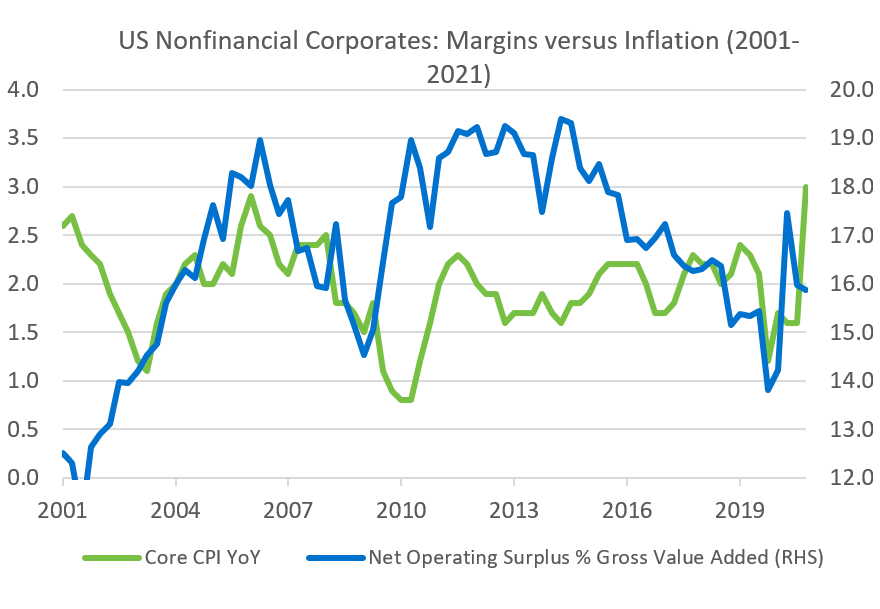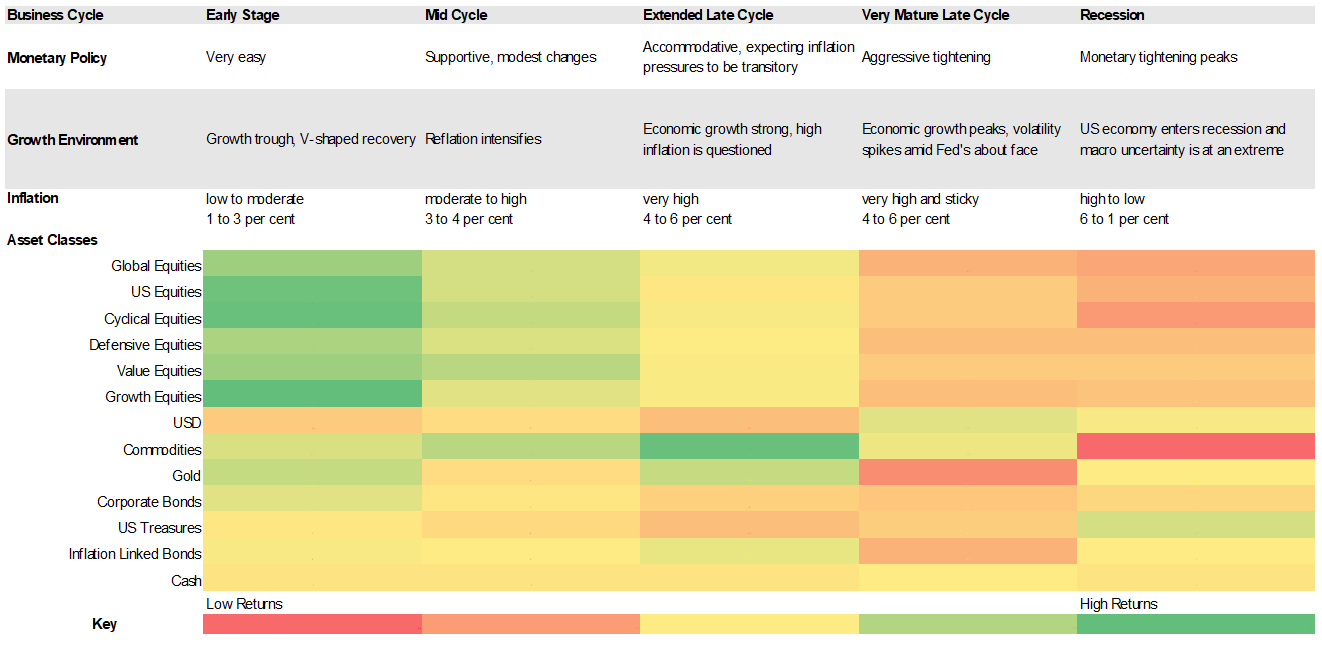What to buy in inflationary times
The biggest question for markets globally is how high will inflation reach and for how long. To understand why it’s such an important question, you need to appreciate the difference between “good” and “bad” inflation. If we experience bad inflation, equity markets will correct and probably sharply. Good inflation will see the bull market roll on.
Good inflation is positively correlated with corporate profit margins. As prices rise, fixed costs become a smaller part of the cost base. Assuming wages can be contained to a level that doesn’t eliminate the extra profits, the result should be extra employment and greater dividends for shareholders. Good inflation theoretically is a level that falls within the central bank target range. For Australia it is 2% to 3%. The below chart shows the generally positive relationship between inflation and corporate profits in the US over the last 20 years.
Corporate Margins Positively Correlated With Moderate Inflation

Source: Bloomberg, Credit Suisse
Bad inflation rises too far above the target range central banks consider normal. Bad inflation results in: high macro economic volatility, equity multiples de-rating due to uncertainty, and aggressive monetary tightening, likely leading to a recession. The below chart is the same as the above, except it covers the decades prior to 2000 so as to include the high inflation periods of the 70’s and early 80’s, (shaded). Very high inflation saw corporate margins hit negatively.
Negative Impact on Corporate Profitability in Periods of High Inflation in the 70’s and 80’s

Source: Bloomberg, Credit Suisse
So should we be worrying about inflation now? For the moment the US Fed and RBA have said they expect transitory factors will cause a short term elevation in inflation to above its normal range. They have no intention of raising interest rates as goods demand reverts to normality, bottle necks are resolved and more spending occurs on services as the Covid vaccines are rolled out. The big debate is what level of inflation will see central banks move earlier than expected. For the US and Australia, that level is core inflation consistently above 4% annualised. Australian inflation is not tracking near this number. However, in the US there is much less wriggle room. The May core CPI printed at 3.8% YoY. But if you annualise the last 3 months, it is above 5%. So far, markets are willing to accept that the big contributors to inflation in the US are transitory factors, including prices of airfares, car rentals and used cars. But what if that changes? How do you position your portfolio to weather an inflation storm?
Before I answer that question, note that a sudden and unexpected spike in inflation is not a reason to panic. It’s not a final destination. It is just another road stop in the economic cycle. The worst case scenario of a recession induced by higher rates won’t be tolerated by central banks for long. They will adjust policy probably before we all expect them to. Below is a table summarising how different asset classes will be likely to act in different scenarios. This will certainly be guiding us as we adjust client portfolios as events unfold.
Changing Asset Class Favouritism For Different Inflation Scenarios

(click to enlarge)
In summary, if our base case of moderate inflation with possible short term spikes is correct, with uncertainty around the persistence of inflation, portfolios should be positioned with a full allocation to share markets. Skew your portfolio to cyclical equities. For our discretionary portfolios, that means old economy stocks like the big three iron ore miners and banks. Highly valued, growth at any price stocks like the Australian technology sector will be friendless. Commodities look attractive in this scenario. Government bonds look fair value at best, but there is more value in corporate bonds. If we experience sticky high or very high inflation, which we consider to be a tail event, both bonds and equities will sell off initially. Cash and unhedged USD exposures will fare best. This may sound alarming, but it’s not. As we saw with the Covid sell off in March last year, all asset classes were sold off briefly before government bonds, as a safe place to invest, bounced back. But one cannot have zero exposure to an asset class thinking you can time getting in and out.
Stick to your long term strategy, which should include government bonds in a balanced or growth portfolio.
Be underweight if you believe inflation is getting out of control. As rate increases start to bite the economy, add to government bonds to protect your capital. Eventually, central banks will get on top of inflation, the cycle will start again, and there will be bargains in equities.
Acknowledgement: This article is based on the research done by my colleague Jasmin Argyrou, Senior Portfolio Manager, Discretionary Portfolios.
Learn more
Credit Suisse Private Banking specialises in asset diversification, holistic wealth planning, next-generation training, succession planning, trust and estate advisory, philanthropy. Stay up to date with our latest insights by hitting the follow button below.
1 topic

